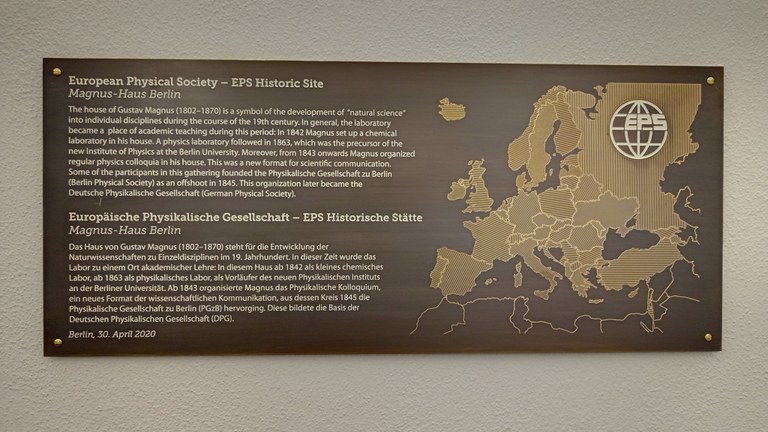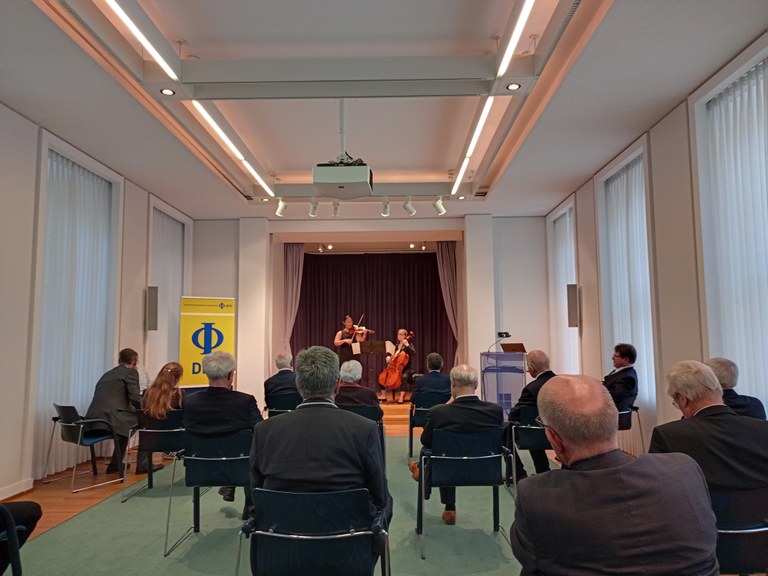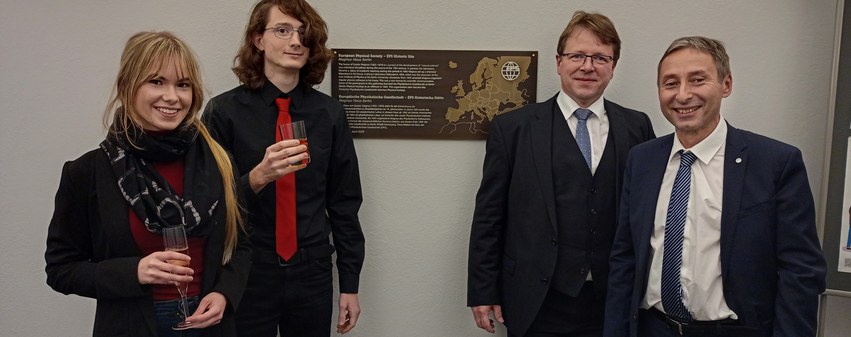The Magnus-Haus Berlin becomes "EPS Historic Site" - Ceremonial Event on 15/10/2021
The Magnus-Haus, capital representation of the DPG and seat of the regional association Physikalische Gesellschaft zu Berlin, is an important European site of the scientific history of physics. The designation as EPS Historic Site was followed by the ceremonial unveiling of a commemorative plaque by the Presidents of the European Physical Society (EPS), Luc Bergé, and the Deutsche Physikalische Gesellschaft (DPG), Lutz Schröter, at a festive event on October 15, 2021. This event was also attended by the Potsdam regional group of the jDPG, represented by Pauleo Nimtz and Maja Ruprecht.
The Magnus-Haus in Berlin's Mitte district, built in the 18th century, is now considered the oldest physics building in Germany. First inhabited by Louis Lagrange, one of the founders of analytical mechanics, it was acquired in 1840 by Professor Gustav Magnus (famous among other things for discovering the Magnus effect). The associate professor of technology, who never specialized in physics but had taught the subject since 1833, set up his private physics laboratory in the Magnus House in March 1843. At that time, it was not only a place of work and a social meeting place for students, but is today considered to be the oldest physics institute in Germany. What's more, the physical colloquium (literally for "scientific discussion") gave rise to the Physikalische Gesellschaft zu Berlin in 1845. Important scientists who worked there in Magnus' time included J. W. Gibbs, H. Helmholtz and W. Siemens.
With Magnus' death in 1870, physics initially moved out of the building. After serving the Society for German-Soviet Friendship at the beginning of the GDR, the building was handed over by Mayor Ebert to the Physical Society of the GDR for permanent use in 1958 on the occasion of Max Planck's 100th birthday. In the 1990s, the building underwent a major renovation, financed in part by Siemens AG, before the DPG signed a 30-year usage agreement with the city of Berlin in 1994. Today, it serves as a bridge between science, business and politics. In 2001, the Senate's decision to sell the building for (only) DM 2.8 million to Siemens AG, which sees its historical roots here with Magnus' student Ernst Werner Siemens, caused a sensation. The DPG will remain the owner of the building until 14/02/2024. What the future holds for this important DPG location after 2024 is uncertain, although Siemens AG assures the DPG that it can remain the main tenant of the premises.
Against the background of this quite bad prognosis for the future, the DPG is all the more pleased to be able to call the Magnus-Haus Berlin now an "EPS Historic Site" and took this distinction as an occasion for the mentioned festive event on 15/10/2021. An interesting program awaited the attendees. After a welcome by Oliver Benson, the chairman of the Physikalische Gesellschaft zu Berlin, the presidents of the EPS and the DPG respectively gave greetings. This was followed by two lectures on the historical significance of the Magnus-Haus and its connection to physics; specifically Stefan L. Wolff, Deutsches Museum Munich: "The Magnus-Haus Berlin as a historical site of physics development between 1840 and 1870" and Ingolf V. Hertel, Max Born Institute Berlin: "The DPG and the Magnus House: milestones 1958, 1990, 1994, 2001, 2024". The program was rounded off by musical contributions from the musicians Sueye Park and Anna Kalvelage on violin and cello. The event was concluded by the unveiling of the commemorative plaque in the entrance area of the Magnus House, followed by a champagne reception.
Despite the uncertain future, we remain optimistic and hope that the Magnus House will be open to the DPG for a long time to come. The enormous importance of the historical building for physics has been shown by the award of the house by the EPS. 

Fotos: ©DPG / Nimtz 2021
